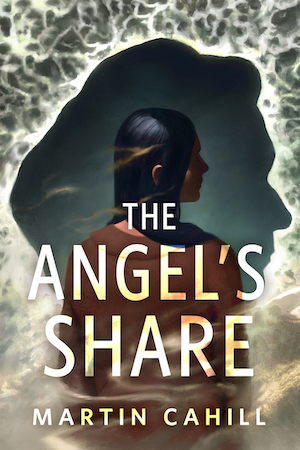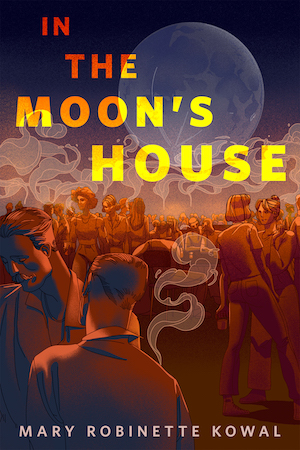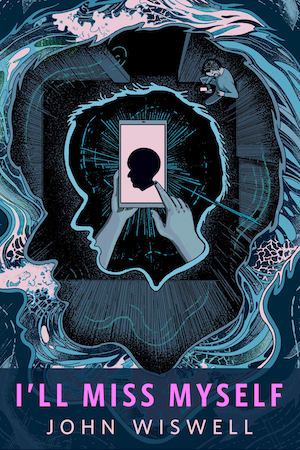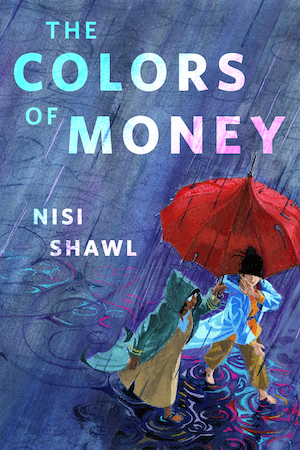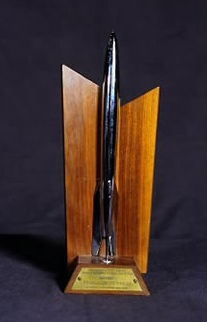In 1956, Worldcon, NYcon II, was held in New York, and they chose a truly great set of Hugo winners, all of which have stood the test of time and all of which I unreservedly approve.
The best novel award went to Robert A. Heinlein’s Double Star, one of my favourite books. That link goes to my full post about it. It’s one of Heinlein’s best novels, a future with a colonized solar system in which one down-and-out actor gets the chance to play the role of a lifetime—impersonating an important politician. It’s short, it’s engaging, it has Martians—it’s unquestionably Hugo worthy.
Again we don’t yet have a list of nominees. There were no other awards that year, so it’s hard to know what else people at the time thought was outstanding.
Looking at the Wikipedia article on 1955 novels, I think there are six other likely books that might have been nominees: Isaac Asimov’s The End of Eternity (post), Frederic Brown’s Martians Go Home, Arthur C. Clarke’s Earthlight, Frederik Pohl and Cyril Kornbluth’s Gladiator-at-Law, J.R.R. Tolkien’s The Return of the King and John Wyndham’s The Chrysalids (post). All of these have since become classics, they’d all have been very worthy nominees. I don’t think any of them are better than Double Star, or likely to have been more popular.
In YA, there was C.S. Lewis’s The Magician’s Nephew; two Andre Norton books, Sargasso of Space (under the name North) and Star Guard; and Heinlein’s Tunnel in the Sky.
Also clearly published as science fiction but I think less likely to have been nominated were: Alien Minds by E. Everett Evans, Address Centauri by F.L. Wallace. Star Bridge by Jack Williamson and James E. Gunn, and by Gunn alone This Fortress World, Stanton A. Coblenz’s Under the Triple Suns, and Robert Silverberg’s first novel Revolt on Alpha C.
I think a very good book won, and in my judgement likely the best book of that year.
Other Categories
Novelette: Exploration Team, Murray Leinster. This was one of the first science fiction stories I read, in Amabel Williams Ellis (ed) Tales From the Galaxies before I knew what science fiction was. I remember it well. Great story, but I haven’t read it lately and I haven’t heard other people talk about it much, so maybe you had to be ten.
Short Story: The Star, Arthur C. Clarke. I think there’s a wide consensus that this is one of the best short stories ever.
Magazine: Astounding, John. W. Campbell. Again! Astounding. Double Star and Exploration Team appeared in it, but The Star appeared in Infinity.
Artist: Frank Kelly Freas.
Fan Magazine: Inside and Science Fiction Advertiser, Ron Smith.
Most Promising New Author: Robert Silverberg. And he’s certainly gone on to fulfil that promise, continuing to write excellent science fiction in all the decades since.
Feature Writer: Willy Ley.
Book Reviewer: Damon Knight. New category, and what an interesting one. I had no idea. I wonder why that died out—were not enough people reviewing books? I’d suggest reviving it. (But then I would…) Knight was an excellent choice, his criticism is still read.
Jo Walton is a science fiction and fantasy writer. She’s published eight novels, most recently Lifelode, and two poetry collections. She has a ninth novel coming out in January, Among Others, and if you liked this post you will like it. She reads a lot, and blogs about it here regularly. She comes from Wales but lives in Montreal where the food and books are more varied.


